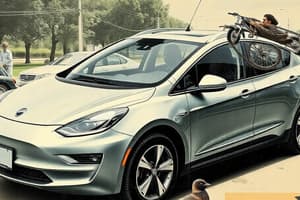Podcast
Questions and Answers
How do electric vehicles operate?
How do electric vehicles operate?
- By converting electrical energy from a battery into mechanical energy (correct)
- By utilizing hydrogen fuel cells for propulsion
- By using gasoline as the primary power source
- By converting mechanical energy from a battery into electrical energy
What is the primary function of the electric motor in an EV?
What is the primary function of the electric motor in an EV?
- Provide lighting for the vehicle
- Convert electrical energy into motion for the vehicle (correct)
- Regulate the temperature of the battery
- Generate electricity for the battery
Which type of electric vehicle relies entirely on battery power for propulsion?
Which type of electric vehicle relies entirely on battery power for propulsion?
- Hybrid Electric Vehicles (HEVs)
- Battery Electric Vehicles (BEVs) (correct)
- Internal Combustion Engine Vehicles
- Plug-In Hybrid Electric Vehicles (PHEVs)
How are electric vehicle batteries usually charged?
How are electric vehicle batteries usually charged?
What distinguishes Plug-In Hybrid Electric Vehicles (PHEVs) from other types of EVs?
What distinguishes Plug-In Hybrid Electric Vehicles (PHEVs) from other types of EVs?
In Hybrid Electric Vehicles (HEVs), how is the battery charged?
In Hybrid Electric Vehicles (HEVs), how is the battery charged?
What is one significant advantage of electric vehicles over gasoline-powered vehicles?
What is one significant advantage of electric vehicles over gasoline-powered vehicles?
Which factor can be a barrier to the widespread adoption of electric vehicles?
Which factor can be a barrier to the widespread adoption of electric vehicles?
Why do many drivers experience range anxiety with electric vehicles?
Why do many drivers experience range anxiety with electric vehicles?
What is a key advantage of electric vehicles in terms of environmental impact?
What is a key advantage of electric vehicles in terms of environmental impact?
Which factor contributes to lower operating costs for electric vehicles?
Which factor contributes to lower operating costs for electric vehicles?
What is a challenge associated with the batteries in electric vehicles?
What is a challenge associated with the batteries in electric vehicles?
Study Notes
Electric Vehicles (EVs): A Comprehensive Guide
Electric vehicles, or EVs as they're commonly known, have been gaining significant momentum, revolutionizing the way we think about transportation. As these zero-emission machines continue to evolve, it's important to understand their inner workings, benefits, and limitations.
How Do Electric Vehicles Work?
An electric vehicle operates by converting electrical energy from a battery into mechanical energy to power the vehicle's wheels. The electric motor, typically positioned near the axle, receives this energy and turns it into motion, making EVs ultra-quiet and smooth in operation.
The battery in an electric vehicle is a critical component that stores energy, usually lithium-ion batteries. These batteries are charged through a charging station or an outlet, and the charging time can vary based on the battery's capacity and the charging equipment.
Types of Electric Vehicles
There are three primary types of electric vehicles:
- Battery Electric Vehicles (BEVs): These vehicles rely entirely on battery power for propulsion.
- Plug-In Hybrid Electric Vehicles (PHEVs): These vehicles are powered by both a battery and an internal combustion engine. The battery can be charged using an external power source.
- Hybrid Electric Vehicles (HEVs): These vehicles use a combination of an internal combustion engine and an electric motor, but the battery cannot be charged externally.
Advantages of Electric Vehicles
EVs offer several significant advantages over traditional gasoline-powered vehicles:
- Low Emissions: EVs produce zero tailpipe emissions, making them environmentally friendly and contributing to reduced air pollution.
- Lower Operating Costs: Electricity is generally cheaper than gasoline, resulting in lower running costs.
- Lower Maintenance: EVs have fewer moving parts and require less maintenance than gasoline-powered vehicles.
- Quiet Operation: Electric vehicles are much quieter than their gasoline counterparts, making them more pleasant to drive and ride in.
Challenges and Limitations of Electric Vehicles
Despite their numerous advantages, electric vehicles also face several challenges:
- Range Anxiety: Many drivers are concerned about the limited range of electric vehicles, which may not be able to cover long distances without requiring a recharge.
- Charging Infrastructure: A lack of charging stations can be a barrier to the widespread adoption of electric vehicles, particularly in rural areas and along certain road corridors.
- Initial Cost: Electric vehicles are generally more expensive than their gasoline-powered counterparts.
- Battery Lifespan: The batteries in electric vehicles have a limited lifespan, and the cost of replacing them can be a significant expense.
Conclusion
Electric vehicles are revolutionizing the transportation industry by offering lower emissions, lower operating costs, and quiet operation. However, they also face challenges such as range anxiety, limited charging infrastructure, and higher initial costs. Despite these challenges, electric vehicles are the future of transportation, and their widespread adoption will result in significant environmental benefits and cost savings for consumers.
As the technology continues to evolve, it's exciting to imagine the possibilities for electric vehicles. From longer-lasting batteries to faster charging times, the future of electric vehicles looks bright. As more people adopt electric vehicles, we can look forward to a cleaner, more sustainable world.
Studying That Suits You
Use AI to generate personalized quizzes and flashcards to suit your learning preferences.
Description
Explore the world of electric vehicles (EVs) with this comprehensive guide. Learn how EVs work, their advantages such as lower emissions and operating costs, as well as the challenges they face like range anxiety and charging infrastructure. Discover the potential future advancements in electric vehicle technology.




